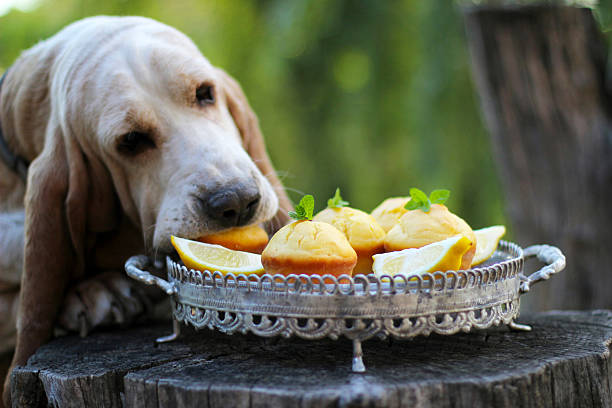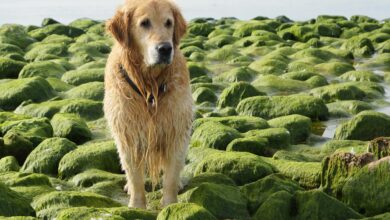Can Dogs Eat Lemon Cake? Tips for Keeping Your Dog Safe-2024

Can Dogs Eat Lemon Cake? The Risks of Feeding Lemon Cake to Dogs? Lemon cake contains citric acid, which can upset your dog’s stomach and lead to vomiting or diarrhea. The sugar and fat in the cake can also contribute to obesity, diabetes, and digestive issues in dogs.
In addition, lemon and other ingredients in the cake can be toxic to dogs if consumed in large amounts. It’s important to avoid feeding lemon cake to your pet to keep them safe and healthy.
So, let’s explore that- Can Dogs Eat Lemon Cake?
Why Dogs Should Avoid High-Sugar and High-Fat Foods
Can Dogs Eat Lemon Cake? When it comes to keeping our dogs healthy, avoiding foods that are high in sugar and fat is essential. While these ingredients might make treats like cakes or cookies taste appealing, they can pose several serious health risks for dogs. Sugary and fatty foods are not only unnecessary for a dog’s diet but can also lead to health problems that affect their quality of life. Below, we’ll discuss the potential issues that high-sugar and high-fat foods can create for dogs.
Obesity
One of the most immediate impacts of high-sugar and high-fat foods on dogs is the risk of obesity. Dogs don’t need added sugars or fats in their diets, and consuming these in large amounts can lead to unhealthy weight gain. Excess weight puts strain on your dog’s joints, muscles, and organs, affecting their mobility and overall health.
- Strain on joints: Extra weight can lead to joint and mobility issues, especially in older dogs.
- Reduced energy: Overweight dogs often feel sluggish and are less inclined to exercise.
- Increased health risks: Obesity can raise the risk of heart disease, respiratory problems, and other serious conditions.
Diabetes Risk
Regular consumption of sugary foods can increase the risk of diabetes in dogs. Just like in humans, an excess of sugar can cause insulin resistance, leading to blood sugar management problems. Diabetes requires lifelong management and can have significant effects on a dog’s health and daily life.
- Insulin resistance: Too much sugar over time can disrupt insulin production, leading to diabetes.
- Frequent urination and thirst: Common symptoms of diabetes that can disrupt your dog’s comfort.
- Dietary restrictions: Diabetes requires specific diets and consistent monitoring, which can be challenging for pet owners.
Pancreatitis
Can Dogs Eat Lemon Cake? High-fat foods can be especially dangerous as they increase the risk of pancreatitis, an inflammation of the pancreas. This condition is not only painful but can also be life-threatening if left untreated. Pancreatitis is more likely in dogs that consume fatty human foods, and certain breeds are particularly prone to it.
- Pain and discomfort: Pancreatitis is extremely painful and can cause abdominal distress.
- Loss of appetite and vomiting: Common symptoms that can worsen the dog’s condition if left untreated.
- Serious health implications: Pancreatitis can lead to further health complications and may require intensive veterinary care.
Can Dogs Eat Lemon Cake? High-sugar and high-fat foods may seem harmless in small amounts, but they can lead to serious long-term health issues in dogs. By sticking to a balanced, dog-appropriate diet, you can help ensure that your pet stays happy, healthy, and active.
Signs Your Dog May Have Eaten Lemon Cake-Can Dogs Eat Lemon Cake?
Can Dogs Eat Lemon Cake? If you suspect that your dog has gotten into a piece of lemon cake, there are a few telltale signs that can indicate they’re experiencing discomfort. While lemon cake might be a tasty treat for humans, it’s loaded with ingredients that aren’t suited for dogs, like sugar, fats, and citric acid from lemons. These can lead to digestive issues and other symptoms of discomfort in your dog. Here’s what to watch for if you think your dog may have eaten lemon cake.
Digestive Upset
One of the first signs that your dog may have eaten lemon cake is digestive upset. The citric acid in lemons and the high-fat content in cake can easily irritate your dog’s stomach, causing visible signs of discomfort.
- Vomiting: A common reaction as your dog’s body tries to rid itself of the upsetting ingredients.
- Diarrhea: A symptom of digestive irritation, particularly if your dog’s stomach is sensitive.
- Stomach discomfort: You may notice your dog whining, pacing, or appearing visibly uncomfortable.
Lethargy
Can Dogs Eat Lemon Cake? After consuming lemon cake, some dogs may become noticeably more sluggish. High sugar and fat content can make dogs feel lethargic, and if they’re not feeling well, they may also seem less enthusiastic about their usual activities.
- Low energy: Your dog may seem tired or reluctant to engage in play.
- Sleepiness: Dogs who are feeling unwell often sleep more than usual as their body recovers.
- Lack of interest in food: If your dog typically has a strong appetite but now seems uninterested, this can be a sign they’re not feeling well.
Excessive Thirst
The sugar and fat in lemon cake can lead to dehydration, prompting your dog to drink more water than usual. Excessive thirst can be a way for dogs to help flush out any upsetting ingredients from their system.
- Increased water intake: You may notice your dog heading to the water bowl more frequently.
- Frequent urination: Higher water intake may result in more trips outside, as your dog’s body processes the extra fluids.
- Possible dehydration: If your dog is not drinking enough, they may appear lethargic or have a dry nose and gums.
Can Dogs Eat Lemon Cake? These symptoms are generally signs of mild discomfort, but if they persist or worsen, it’s a good idea to contact your veterinarian. Watching for these signs can help you take quick action and ensure that your dog stays safe and healthy.
What to Do If Your Dog Eats Lemon Cake
Can Dogs Eat Lemon Cake? If your dog has gotten into some lemon cake, it’s natural to be concerned about the possible effects. Lemon cake contains ingredients like sugar, fats, and citric acid, which aren’t ideal for dogs and can cause digestive upset or more serious symptoms. Here’s a straightforward guide on what to do next to help your dog feel better and ensure their safety.
Monitor Symptoms
After your dog eats lemon cake, start by watching for any signs of discomfort. Digestive issues are common with foods high in sugar, fats, and acidic ingredients, and symptoms may appear within a few hours.
- Look for signs of nausea: Watch for lip licking, drooling, or attempts to vomit.
- Observe diarrhea: Diarrhea is a common response to ingredients that irritate the digestive tract.
- Check for lethargy: If your dog seems unusually tired or reluctant to engage, it could be a sign they’re not feeling well.
Hydrate
Can Dogs Eat Lemon Cake? Ensuring that your dog has access to fresh water can help them process and flush out the lemon cake ingredients. Hydration can ease digestion and reduce the impact of high sugar and fat levels.
- Encourage gentle hydration: Offer water to help with any mild stomach upset.
- Prevent dehydration: If your dog experiences vomiting or diarrhea, hydration is key to maintaining their health.
- Avoid giving additional treats: To avoid further stress on their stomach, hold off on other snacks or rich foods for the time being.
Vet Consultation
If your dog ate a large amount of lemon cake or is showing severe symptoms, contacting your vet is a wise step. A professional can guide you on whether any additional action is needed and can advise on ways to alleviate your dog’s discomfort.
- Call your vet: Describe the situation, including how much cake was eaten and any symptoms you’re seeing.
- Follow vet advice: Your vet may suggest monitoring your dog at home or, in some cases, bringing them in for an examination.
- Seek urgent care if needed: If symptoms like continuous vomiting, severe lethargy, or signs of pancreatitis (such as a tender belly) occur, visit an emergency vet clinic.
Can Dogs Eat Lemon Cake? By following these steps, you can help manage any potential effects of lemon cake on your dog and keep them as comfortable as possible.
Safer, Healthier Treat Alternatives for Your Dog
Can Dogs Eat Lemon Cake? If you’re looking for tasty treats that are both safe and nutritious, there are plenty of options that don’t carry the risks of sugary or fatty desserts like lemon cake. These alternatives are packed with vitamins, fiber, and other nutrients that can support your dog’s health without upsetting their stomach.
Sweet Potato Bites
Sweet potato is an excellent treat for dogs because it’s rich in fiber and essential vitamins, making it both filling and nutritious. Dogs tend to love the taste, and these treats are easy to prepare at home.
- High in fiber: Sweet potatoes aid digestion and keep your dog’s stomach happy.
- Loaded with vitamins: Sweet potatoes provide vitamins A, C, and B6, supporting vision, immune health, and energy.
- Low in fat: They’re a healthy snack that doesn’t carry the risks associated with fatty treats like cakes or pastries.
Frozen Yogurt
Frozen, unsweetened yogurt is a refreshing, creamy treat for dogs, especially on warm days. It’s a safe way to give your dog a “dessert” that’s free from added sugar and excessive fats.
- Cool and hydrating: A frozen yogurt snack can keep your dog refreshed and hydrated.
- Good for digestion: Yogurt contains probiotics that support your dog’s digestive health.
- Safe alternative to ice cream: Unlike regular ice cream, plain yogurt doesn’t contain artificial flavors, sugars, or dairy ingredients that could upset your dog’s stomach.
Apple Slices
Can Dogs Eat Lemon Cake? Apple slices are a quick and easy snack that provides vitamins and fiber, making them a great healthy choice. Just be sure to remove the seeds, as they contain small amounts of cyanide and can pose a choking risk.
- Rich in vitamins: Apples contain vitamins A and C, which support skin, coat, and immune health.
- Packed with fiber: The fiber in apples promotes digestion and can be helpful for dogs with sensitive stomachs.
- Low in calories: Apple slices are a low-calorie snack that satisfies your dog’s sweet tooth without the risks of sugary desserts.
Offering these healthier, dog-friendly alternatives can keep your pup happy and healthy, while still satisfying their cravings for a tasty treat. By opting for nutritious snacks, you can enjoy bonding moments with your dog without worrying about harmful ingredients or digestive upsets.
How to Safely Introduce New Treats to Your Dog
Can Dogs Eat Lemon Cake? Introducing new treats can be a fun way to add variety to your dog’s diet, but it’s essential to do so carefully. By following a few simple steps, you can ensure that any new treat is safe and enjoyable for your pup without causing digestive issues or allergic reactions.
Start Slowly
When giving your dog a new treat, start with a small amount and monitor how they react. This gradual approach helps avoid overwhelming their digestive system, especially if the treat has a different texture, flavor, or ingredient profile than they’re used to.
- Begin with small portions: A small piece or two is enough to start.
- Watch for immediate reactions: Some dogs might show an upset stomach right away if they’re sensitive to the treat.
- Wait before giving more: If your dog has no reaction after a day or two, you can increase the portion slightly.
Observe for Allergies
Can Dogs Eat Lemon Cake? Some dogs may have allergies or sensitivities to certain ingredients, which can show up as skin reactions, stomach issues, or even changes in behavior. Monitoring your dog for any unusual symptoms will help you catch any problems early on.
- Look for physical symptoms: Common signs of allergies include itching, swelling, or red skin.
- Check for digestive upset: Vomiting, diarrhea, or excessive gas can indicate a sensitivity.
- Note changes in behavior: If your dog becomes lethargic or unusually restless, it may be due to the new treat.
Stick to Dog-Safe Ingredients
Choosing treats specifically designed for dogs ensures they don’t contain any harmful ingredients. Many human foods contain additives, spices, or other elements that can upset a dog’s stomach or be toxic.
- Avoid harmful ingredients: Steer clear of treats with chocolate, garlic, onions, or excess salt and sugar.
- Opt for natural ingredients: Look for treats with limited, whole-food ingredients like sweet potato, apples, or pumpkin.
- Check for dog-safe labels: Dog-specific treats are formulated to be easily digestible and safe for canine health.
Can Dogs Eat Lemon Cake? Taking these precautions when introducing new treats helps keep your dog safe, healthy, and excited about trying something new. Starting slowly, watching for signs of allergies, and choosing dog-safe treats are simple steps to ensure that treat time is as enjoyable as it is safe for your furry friend.



